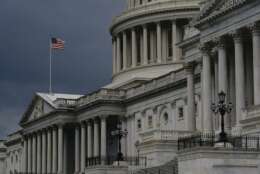Budget
-
The General Services Administration stands out as one of only eight agencies that received an A+, meeting all of its prime and subcontracting goals last year – including women-owned and HUBZones.
August 27, 2021 -
In today's Federal Newscast, the Pentagon is determining what it should do with billions intended for the Afghan armed forces.
August 25, 2021 -
Michele Evermore, senior policy adviser on unemployment insurance at the Labor Department, talked about some of the efforts now underway via the American Rescue Plan.
August 25, 2021 -
Congress is focused this week on long-term infrastructure spending. But the clock is quickly winding down on the end of the fiscal year deadline to keep the basic functions of government working.
August 24, 2021 -
Congress has fewer than six weeks left to figure out how to avert a government shutdown. But for the moment, the focus is on multiyear spending – including the infrastructure package.
August 23, 2021 -
There are real questions about the duration of a likely continuing resolution, and whether it’ll be long enough to avert a government shutdown.
August 17, 2021 -
The trillions Congress printed to respond to the pandemic were supposed to come with a tough regime of oversight and transparency. But that only partially came true.
August 16, 2021 -
In the vaccine debate madness engulfing the country, one might overlook that members of Congress are under no mandate to get vaccinated themselves.
August 16, 2021 -
In today's Federal Newscast, new salary caps mean House staffers can now make up to nearly $200,000 a year.
August 16, 2021 -
This edition of On DoD features a long discussion on the subject of Defense reform. Our guest is retired Maj. Gen. Arnold Punaro, who's just written a new book: The Ever Shrinking Fighting Force.
August 01, 2021 -
The House minibus includes a silent endorsement of the president's proposed federal pay raise for civilian employees in 2022. The Senate hasn't introduced spending bills yet for 2022.
July 30, 2021 -
When Pentagon leadership discusses the rising threat of China, are they putting military dollars where their mouths are? For answers, Federal Drive turned to Govini Senior Vice President Jim Mitre.
July 30, 2021 -
The Biden administration has proposed a $6.5 billion advanced research projects agency as part of the National Institutes of Health.
July 26, 2021 -
Between the defense authorization bill, work on a potential infrastructure package and annual spending legislation, members of Congress are hoping to get at least a few big things finished.
July 26, 2021 -
As Congress prepares to spend relatively more money than it spent on World War II, the question arises whether the federal workforce even has the capacity to carry out whatever programs the coming money will spawn.
July 23, 2021














